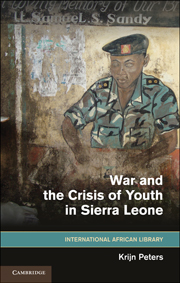Book contents
- Frontmatter
- Contents
- Acknowledgements
- Abbreviations
- Introduction
- 1 Voices from the Battlefield: Ex-Combatants' Views on Root Causes of the War and Their Reasons for Participation
- 2 The Socio-Economic Crisis of Rural Youth
- 3 Conflict in Sierra Leone and Recruits to the War
- 4 The World of the RUF
- 5 Malfunctions and Atrocities
- 6 Cultivating Peace: RUF Ex-Combatants' Involvement in Post-War Agricultural Projects
- 7 Footpaths to Reintegration? Agrarian Solutions for the Reintegration of Ex-Combatants
- 8 Conclusion: The RUF as a Rural Underclass Project
- Epilogue
- Annex I A Chronology
- Annex II Overview: Interviewed Ex-RUF Combatants
- References
- Index
- THE INTERNATIONAL AFRICAN LIBRARY
4 - The World of the RUF
Published online by Cambridge University Press: 03 May 2011
- Frontmatter
- Contents
- Acknowledgements
- Abbreviations
- Introduction
- 1 Voices from the Battlefield: Ex-Combatants' Views on Root Causes of the War and Their Reasons for Participation
- 2 The Socio-Economic Crisis of Rural Youth
- 3 Conflict in Sierra Leone and Recruits to the War
- 4 The World of the RUF
- 5 Malfunctions and Atrocities
- 6 Cultivating Peace: RUF Ex-Combatants' Involvement in Post-War Agricultural Projects
- 7 Footpaths to Reintegration? Agrarian Solutions for the Reintegration of Ex-Combatants
- 8 Conclusion: The RUF as a Rural Underclass Project
- Epilogue
- Annex I A Chronology
- Annex II Overview: Interviewed Ex-RUF Combatants
- References
- Index
- THE INTERNATIONAL AFRICAN LIBRARY
Summary
Introduction
Former fighters of the Revolutionary United Front (RUF) – the main protagonists of the war in Sierra Leone – have hardly been heard to date. During the war (1991–2002) interviews were conducted with demobilised combatants of other factions (cf. Peters and Richards 1998a; 1998b) but it proved nearly impossible to talk with RUF fighters. Only a few managed to escape. One or two were then accessed (see one such interview in Peters and Richards 1998a). But most prisoners were killed by the army or the pro-government Civil Defence Forces (CDF), or were extremely difficult to trace. When the war was declared over in January 2002 access to all parts of the country and to all groups opened up. It was then possible to make a purposive selection of various categories of ex-RUF combatants – including low and high ranks, volunteers and conscripts, and combatants with the RUF from the beginning and those who came in only at the end. This chapter presents material from interviews conducted with former RUF combatants. The purpose is twofold: to offer an account of how the RUF guerrilla campaign was organised, operated, and developed, and to find ways to explain the data in question.
Most of the material presented in the following two chapter was collected during fieldwork undertaken in three periods – November–December 2001 (see also Peters 2004), November 2002–October 2003, and November–December 2006. Interviews were conducted in districts with a heavy RUF presence during the war, namely Kenema, Kailahun, Bombali, and Tonkolili.
- Type
- Chapter
- Information
- War and the Crisis of Youth in Sierra Leone , pp. 80 - 137Publisher: Cambridge University PressPrint publication year: 2011

